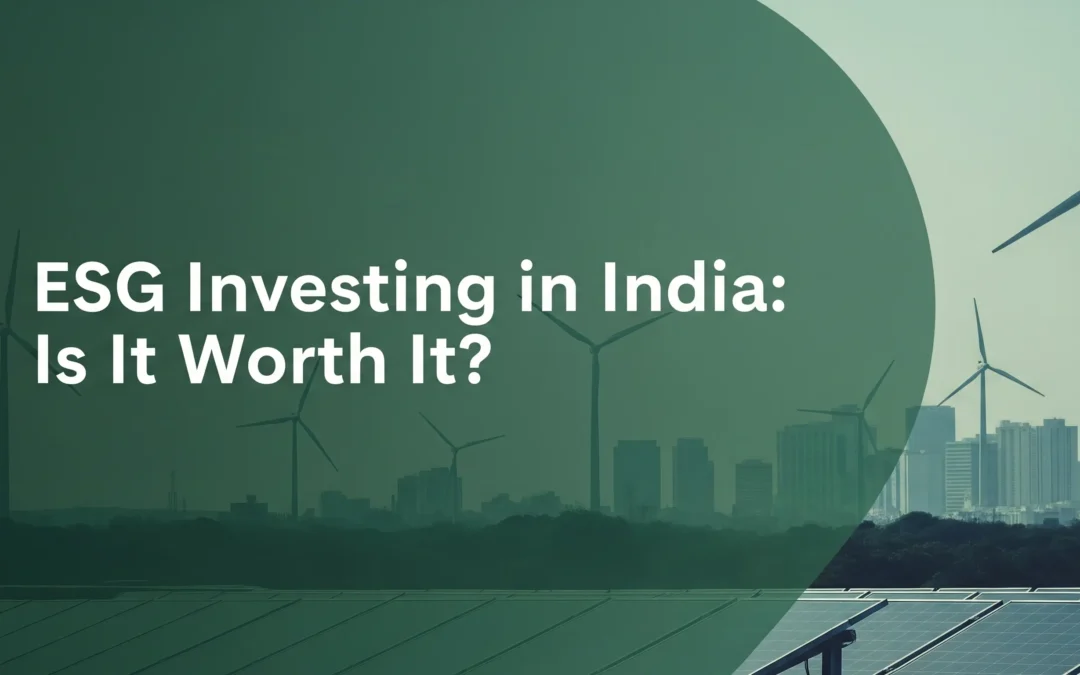The rise in ESG investing. Environmental, Social, and Governance (ESG) focuses on social justice, climate change, and ethical business practices. It shows the world shifting towards more conscious choices. The investors are realizing that it is not a choice but a much-needed reality.
The change in perspective is not only useful ethically but also financially. When a company focuses on ESG measures, it is assumed that they are ultimately going to perform well in the long run. They also become eligible for government schemes that will lead to savings in tax and other monetary incentives. But, is ESG investing that good? Many people are left wondering if it is worth it in the Indian context because the market is still in its early stages of adopting ESG.
Let’s examine ESG investing’s operation and potential as India’s wealth-building strategy.
What Is ESG Investing?
It is a theme-based strategic investing that incorporates environmental, social, and governance factors into investment decisions, alongside financial considerations. The investors feel responsible towards society and support in growth of such companies that focus on sustainable growth.
ESG investing makes stakeholders realize that growth is important, but not at the cost of damaging the environment and creating a disbalance. It creates awareness of social justice, climate change, and corporate accountability, and grows on a global scale.
Key Characteristics:
- Non-financial aspects that could affect long-term performance are taken into account in a holistic evaluation.
- Eliminates businesses that could face fines from the government, scandals, or negative public opinion.
- Promotes resource efficiency and environmentally friendly behavior, making the company work on its sustainability.
- When making investment decisions, ethical alignment takes into account one’s own or an organization’s values.
- Gives preference to companies with robust accountability and disclosure procedures, making the overall process more transparent.
Example:
Suppose you have to choose between two Indian businesses:
- Company X: A cement manufacturer that makes profits but lacks a sustainability report, has a high carbon footprint, and frequently violates safety regulations.
- Company Y: A mid-sized manufacturing company with comparatively lower profits, but has an independent board, gender diversity initiatives, and renewable energy use.
- Company X may have higher immediate profits. But, in the long run, Company Y has more scope for growth and also exhibits long-term viability, ethical conduct, and environmental responsibility.
Is ESG Investing Worth It?
Every coin has two sides, so it is the ESG investing. It may have several pros, but it may also present challenges for some investors. Here is the list of pros and cons to help you with the same.
Pros:
- Long-term stability: Businesses that adhere to ESG standards frequently demonstrate superior resilience and risk management.
- Improved regulatory alignment: ESG-friendly businesses may gain from the government’s growing emphasis on social and environmental policies.
- Millennial appeal: The demand for ESG products is rising as younger investors favor matching money with values.
Cons:
- Limited track record: There isn’t much historical performance data because ESG investing is still relatively new in India.
- Subjective scoring: Investors may become confused by the differences in ESG ratings across agencies.
- Short-term underperformance: Because of their limited sector exposure (e.g., mining, energy), some ESG funds may perform worse than traditional funds in bull markets, although this is not always the case.
How to Start ESG Investing in India
Many Indian investors are looking to match their portfolios with their values as a result of increased awareness of sustainable development. Here’s a methodical way to begin responsibly and efficiently:
1. Establish Your ESG Priorities
Think about the ESG factors that are most important to you before investing. For that, you can ask yourself questions like:
- Are renewable energy sources and climate change more important to you?
- Do you prioritise moral leadership and corporate governance?
- Do you support fair labour practices?
2. Examine ESG ETFs and Mutual Funds
For Indian investors, there are several mutual funds and ETFs that run on the theme of ESG. It helps in narrowing down the options for the investors and filters out the companies that are out of line with the ESG measures.
Example:
| Fund Name | Fund House | Expense Ratio | Ideal For |
| SBI Magnum ESG Fund | SBI Mutual Fund | ~1.75% | Long-term sustainability investors |
| Axis ESG Equity Fund | Axis Mutual Fund | ~2.10% | Moderate risk-takers |
| ICICI Prudential ESG Fund | ICICI Prudential AMC | ~1.90% | Governance-focused investors |
3. Make use of ESG Reports and Ratings
To make sure the fund or business is sustainable, look at independent ESG ratings, not just the marketing labels. Organisations provide a thorough analysis based on data and disclosures that are accessible to the public.
Examples:
- ESG Ratings from MSCI
- CRISIL ESG Ratings
- ESG Ratings for Refinitiv India
4. Invest in Individual Stocks That Comply with ESG
For investors who would rather be directly exposed to equity:
- Examine businesses that have demonstrated a strong commitment to sustainability.
- Steer clear of businesses with a lot of fossil fuel exposure, environmental infractions, or unethical labour practices.
Example: Wipro, HDFC Bank, Tata Consultancy Services, and Infosys frequently obtain high ESG ratings.
5. Create a Diversified Investment Portfolio
Even though it can be a powerful theme strategy, focus on combining ESG stocks or funds with other assets for maximum gains:
- Blue-chip companies
- Bonds or debt funds
- ETFs for gold
- Index funds
Bottomline
In India, ESG investing is a deliberate shift towards responsible capitalism rather than merely a fad. Supporting businesses that respect people, the environment, and ethical governance, it promotes sustainable growth even though it might not guarantee immediate high returns. ESG can be a useful complement to a well-balanced portfolio for investors looking for long-term stability with a positive social impact.
However, awareness, perseverance, and a little due diligence are necessary for success in this theme strategy. The ESG ecosystem is expected to grow significantly as India embraces transparency, regulation, and green innovation. ESG investing is not only a wise financial decision, but also a responsible one in a future where profits and purpose coexist.
The path to long-term wealth for Indian investors begins right now.
Written by: Tanya Kumari


